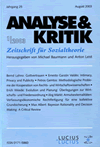Suchergebnisse
"Michael Taylor"
Titel: Cooperation, Norms, and Moral Motivation
Autor: Michael Taylor
Seite: 70-86
Abstract: It has been said that norms can solve collective action problems. To endorse a norm is to hold a normative belief. This article insists that we try to isolate moral motivation - motivation by moral belief - as such, and that its existence cannot be taken for granted. Accepting the Humean view that belief alone cannot motivate, the article rejects the thesis that there is a necessary or conceptual connection between moral belief and motivation; it warns that in looking for motivational powers or effects of normative belief we must take care to rule out the possibility that the motivation is merely derived from existing desires; and it argues that deliberation and evaluation do not produce desires purely out of beliefs. These considerations are among the necessary preliminaries to getting clear about the role of 'social capital' in solving collective action problems.
Titel: Zu M. Taylors Analysen des Gefangenendilemmas
Autor: Hartmut Kliemt / Bernd Schauenberg
Seite: 71-97
Abstract: The theory of garnes, though at first greeted with great expectations by some social scientists, soon became a source of frustrated hopes to many of them. Too much of the theory seemed to be devoted to "zero-sum" and "one-shot" games. But most social contexts are not zero-sum and involve repeated interaction too. There was a certain lack of such game theoretic models which could be successfully adapted to social phenomena as were apt to appear in reality. Recently the theory of games seems to be on its way to closing this gap within a special branch devoted to "repeated games" or "supergames". Very promising is the approach of Michael Taylor which is surveyed and discussed in the subsequent paper. This approach has two main merits: First it can be understood with a modest mathematical background, secondly it can be adapted easily to a more precise reconstruction of classical topics in political theory. Though one might not agree with some of Taylor's conclusions it seems to be worthwhile to get acquainted at least with the basics of his analysis and to take it as a first step to opening avenues for future social research.

The Actuality of Communitarianism
2005 (27) Heft 2
Editorial
'Communitarianism' drew extraordinary public attention in the early nineties and still exerts some influence on the social sciences and political philosophy, even if it is no longer as controversially debated as in former days. What still fires interest in the claims and ideas of communitarianism today, albeit on a lower level of public attention, is the widely felt fascination, in part perhaps also trepidation, vis-a-vis non-individualist social phenomena and trans-individualist social values a...

James S. Coleman's Foundations of Social Theory II
1993 (15) Heft 1
Editorial
In ANALYSE & KRITIK 2/92 wurde mit Beiträgen von Hartmut Esser, Karl-Dieter Opp, Russell Hardin, Norman Braun, Werner Raub, Dennis C Mueller und Peter Kappelhoff ein Symposium zu James S. Colemans vielbeachteten Buch Foundations of Social Theory eröffnet. In dem vorliegenden Heft wird dieses Symposium mit Beiträgen von Peter M. Blau, Raimo Tuomela, Andreas Diekmann, Michael Baurmann sowie einer Erwiderung von James S. Coleman weitergeführt. Ein Aufsatz von Michael Taylor wurde zwar nicht als...

James S. Coleman's "Foundations of Social Theory" I
1992 (14) Heft 2
Editorial
James S. Colemans "Foundations of Social Theory" werden in ihrer Bedeutung für die Sozialwissenschaften von manchen mit Talcott Parsons' "Structure of Social Action" verglichen. Während jedoch Parsons mit seiner ,voluntaristischen Handlungstheorie, ein neues Paradigma für die Soziologie begründen wollte, stützt sich Coleman auf die ökonomische Theorie rationalen Handelns, die auch in der Soziologie bereits eine Forschungstradition hat. Anstatt eine grundsätzliche Neuerung in die Wege zu l...